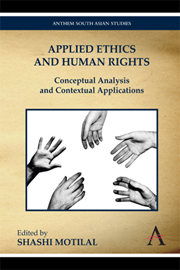Book contents
- Frontmatter
- Contents
- Preface
- Introduction
- Part One Rights, Obligations and Responsibilities
- 1 Applying Ethics: Modes, Motives and Levels of Commitment
- 2 Jurisprudence and the Individual: Bridging the General and the Particular
- 3 Why Moral Relativism Does Not Make Sense
- 4 Human Rights – A Theoretical Foray
- 5 Moral Relativism and Human Rights
- 6 Complicity and Responsibility
- 7 Dharma: The Overriding Principle of Indian Life and Thought
- 8 Moral Foundations of Social Order as Suggested in the Vaiśeṣikasūtras
- 9 Modern Western Conception of Justice as Equality before the Law and Dharmaśāstras
- Part Two Human Rights Issues
- Notes on Contributors
5 - Moral Relativism and Human Rights
from Part One - Rights, Obligations and Responsibilities
Published online by Cambridge University Press: 05 March 2012
- Frontmatter
- Contents
- Preface
- Introduction
- Part One Rights, Obligations and Responsibilities
- 1 Applying Ethics: Modes, Motives and Levels of Commitment
- 2 Jurisprudence and the Individual: Bridging the General and the Particular
- 3 Why Moral Relativism Does Not Make Sense
- 4 Human Rights – A Theoretical Foray
- 5 Moral Relativism and Human Rights
- 6 Complicity and Responsibility
- 7 Dharma: The Overriding Principle of Indian Life and Thought
- 8 Moral Foundations of Social Order as Suggested in the Vaiśeṣikasūtras
- 9 Modern Western Conception of Justice as Equality before the Law and Dharmaśāstras
- Part Two Human Rights Issues
- Notes on Contributors
Summary
Is morality (our sense of ‘right’ and ‘wrong’) at core relative or absolute? Few questions have engaged the attention of philosophers, anthropologists and other intellectuals so deeply and for so long as this one. The debate between Moral Relativism and Moral Absolutism (each claiming to be the true theory about morality) has thrived because of the experience of moral diversity of a multicultural society in which one sees the confrontation of diverse moral values and practices. It is true that cultural diversity expressed in diversity of lifestyles (including attire and diet), beliefs, practices, language, etc., among different ethnic groups, may not, in many cases, be moral diversity, for there could be differences of dress and diet without any moral differences. But often, cultural diversity is accompanied by moral diversity. Moral diversity simply means that there are moral beliefs held by one group of people that are not held by another, and this is obviously true. But, it is quite possible that both these groups believe in the same basic moral principles which when applied to their individual contexts yield different and sometimes opposing moral beliefs. E.g., the Inuits think it is right to kill their parents after the parents have reached a certain age – and the parents expect this – rather than have them bear the hardships of their hazardous life. This would be considered to be a totally wrong practice in most other communities where parents are venerated.
- Type
- Chapter
- Information
- Applied Ethics and Human RightsConceptual Analysis and Contextual Applications, pp. 67 - 82Publisher: Anthem PressPrint publication year: 2010



